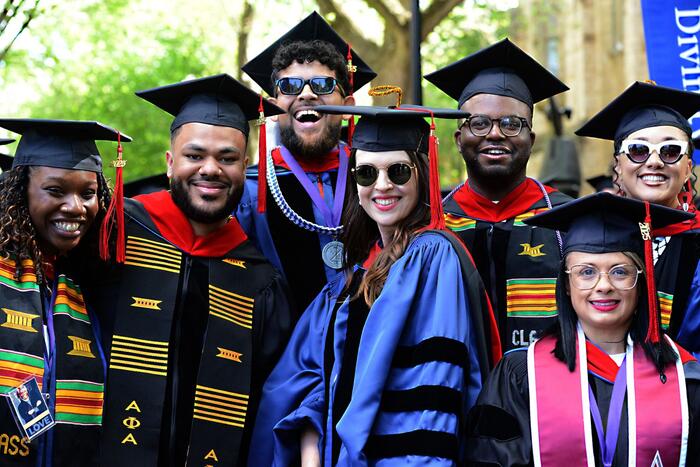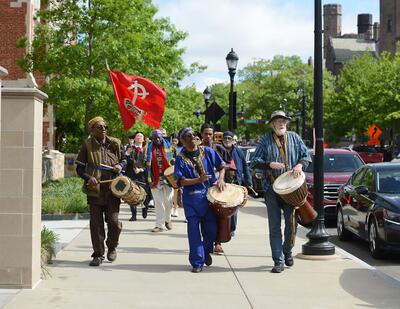May 19, 2025
In his annual Commencement address today, Yale Divinity School Dean Greg Sterling urged the 106 graduates to accept the responsibility of leadership as they pursue their callings and careers, and to lead with courage and moral conviction.
“Our world is in chaos. It desperately needs people to lead with a moral compass, who will stand their ground even if it costs them,” Sterling told the Class of 2025 and the faculty, friends, and family who joined them on the Divinity Quadrangle. “There is a great deal at stake—to my mind more than at any other time in my life.”
 Sixty graduates received the Master of Arts in Religion (M.A.R.) degree at Monday’s ceremony, held on a breezy, sun-splashed afternoon. Another 38 received the Master of Divinity (M.Div.) degree, and eight the Master of Sacred Theology (S.T.M.).
Sixty graduates received the Master of Arts in Religion (M.A.R.) degree at Monday’s ceremony, held on a breezy, sun-splashed afternoon. Another 38 received the Master of Divinity (M.Div.) degree, and eight the Master of Sacred Theology (S.T.M.).
According to statistics collected by the Office of Vocation and Leadership, 45 percent of the M.A.R. graduates are moving onto Ph.D. studies and other graduate programs. Eleven percent are taking teaching positions, and 11 percent are going into non-profit and justice work.
Fifty-five percent of the M.Div. graduates are entering church positions and other forms of ministry work such as chaplaincy. Another 12 percent are beginning other graduate programs, with roughly an equal number moving into positions at schools as teachers or administrators.
The “diverse and distinguished” graduates, Sterling noted, range in age from 22 to 60 and come from many parts of the world outside the United States, including such countries as Egypt, Indonesia, Nepal, and Portugal.
Meet these graduates: Profiles of 10 members of the Class of 2025
 Commencement 2025 began Monday morning with an African drum corps leading the YDS faculty and graduates on a march “downtown” to Yale’s main campus, where the Divinity School contingent took part in the University-wide Commencement ceremony. The event offered a high moment for the Divinity School community: the awarding of an honorary degree to YDS/Berkeley alum Michael Curry ’78 M.Div., former Presiding Bishop of the Episcopal Church. The citation described him as a “faithful and fiery shepherd, and a man of good hope who proclaims his desire for a church that looks and acts like Jesus.”
Commencement 2025 began Monday morning with an African drum corps leading the YDS faculty and graduates on a march “downtown” to Yale’s main campus, where the Divinity School contingent took part in the University-wide Commencement ceremony. The event offered a high moment for the Divinity School community: the awarding of an honorary degree to YDS/Berkeley alum Michael Curry ’78 M.Div., former Presiding Bishop of the Episcopal Church. The citation described him as a “faithful and fiery shepherd, and a man of good hope who proclaims his desire for a church that looks and acts like Jesus.”
Yale awards eight honorary degrees: Read more
After the YDS contingent reconvened on the Quad for the Divinity diploma ceremony, Sterling opened his remarks by noting the many YDS graduates who are (and have been) deans and presidents of academic institutions and heads of church denominations. He suggested to the graduates that many of them, too, will become leaders of organizations, whether that is their current intention or not. “I never aspired to be a dean when I was sitting where you are,” Sterling told the class. “But life sometimes has changes in the course our careers take. God has a keen sense of humor and sometimes surprises us.”
In an address sprinkled with lessons from personal experience, Sterling laid out four characteristics of a courageous leader that he has learned over his 13 years leading YDS and, before that, the graduate school at Notre Dame.
YDS Commencement 2025: Watch the video
 First, be creative. What worked yesterday, he said, will not necessarily work tomorrow. Leaders are not expected to produce all the good ideas themselves, he added. “But you have to recognize good ideas when people present them.” Whether you’re advancing your own innovative idea or one generated by another, “you need to be a visionary who helps to set an agenda that will lead the people you serve in a positive direction.”
First, be creative. What worked yesterday, he said, will not necessarily work tomorrow. Leaders are not expected to produce all the good ideas themselves, he added. “But you have to recognize good ideas when people present them.” Whether you’re advancing your own innovative idea or one generated by another, “you need to be a visionary who helps to set an agenda that will lead the people you serve in a positive direction.”
Second, be consultative. “You may be the final decision-maker, but you should not be the sole decision-maker,” Sterling said. “Make sure you hire people who are talented, and make sure they know they can challenge you.”
Third, be courageous. “You will be in situations where you have to make a decision and no matter what you decide, you will be criticized,” Sterling said. In matters where no great principles are at stake, the prudent course is often the one that brings the least damage. But when decisions revolve around matters of principle, you have no choice, the Dean said: You have to make the principled decision and, if necessary, “fall on your sword.” Courage also means a willingness to risk failure, Sterling added. “Don’t be afraid to take a chance even if it exposes your neck.”
 Fourth, be committed to the people you serve. “Being a leader is not about you. It is not about how you can make your life comfortable,” Sterling said. Rather, leaders must dedicate themselves to the well-being of those they serve, he said, pointing to Jesus of Nazareth and Mahatma Gandhi as exemplars.
Fourth, be committed to the people you serve. “Being a leader is not about you. It is not about how you can make your life comfortable,” Sterling said. Rather, leaders must dedicate themselves to the well-being of those they serve, he said, pointing to Jesus of Nazareth and Mahatma Gandhi as exemplars.
“I hope you will be creative, consultative, courageous, and committed,” Sterling concluded. “You may not know where you’re going to end up. But most of you will find yourselves in a leadership position. My father taught me a simple formula. He said ability plus opportunity equals responsibility. You have great ability or you wouldn’t be sitting here. When the opportunity comes for you to lead, you will have responsibility. I urge you to accept that responsibility and lead.”